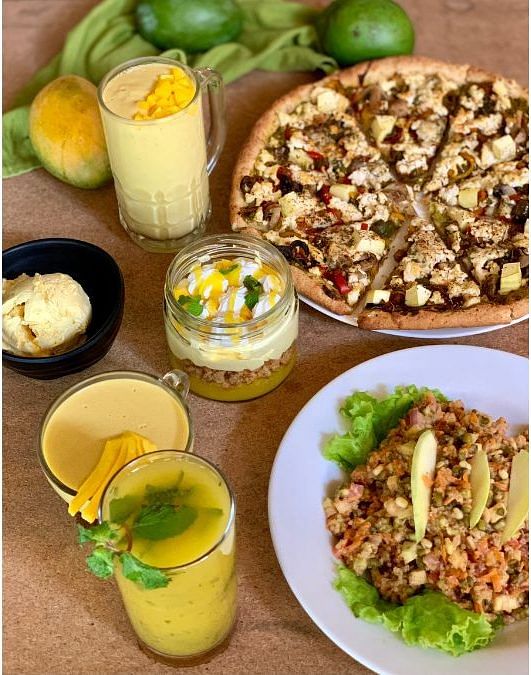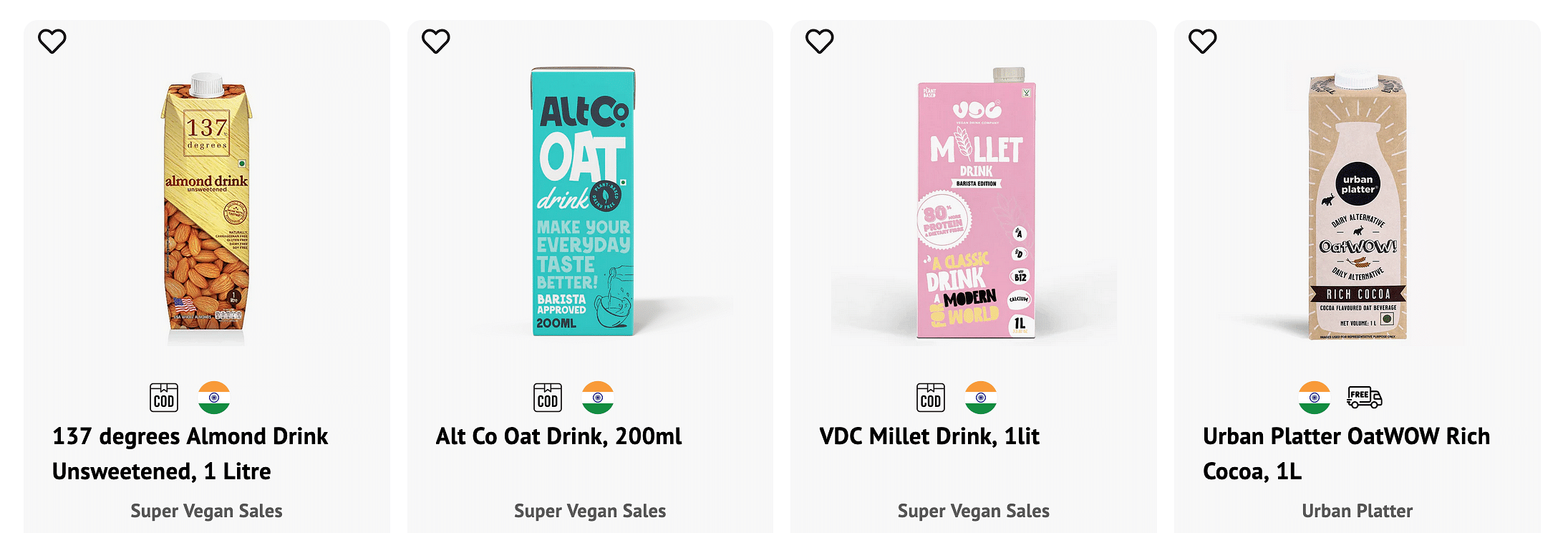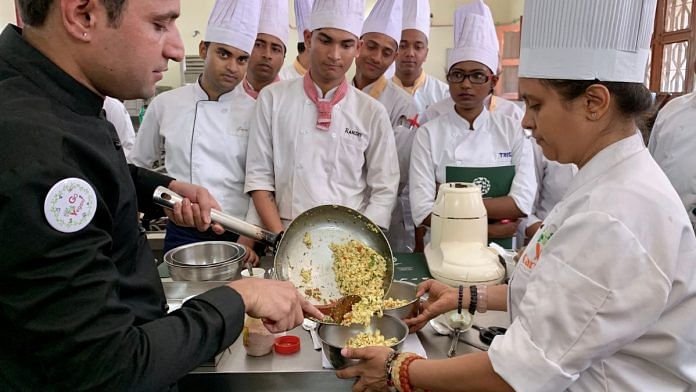Bengaluru: Chartered accountant Radhika Datt turned vegan in 2016 after hearing about the condition of the animals that her sister would rescue. In 2018, she turned her lifestyle into her profession and came on board as cofounder of Good Mylk, now One Good, one of India’s largest vegan brands. It was recently acquired by Nourish You, which is dubbed India’s first superfoods brand, in what was the largest acquisition in the plant-based market in the country
In the past six years, Datt has seen the urban Indian community slowly adopt veganism, so much so that food delivery apps now have dozens of vegan options available.
“About five years ago, there were less than 10 vegan food brands; today there are over 50. They’ve all found commercial success. Even premium brands that have been around for decades have their own successful vegan lines,” Datt said.
Long known for vegetarianism around the world, Indians are now stepping into the brave new world of veganism. As upwardly mobile middle classes grow, so do new food lifestyles. There has been a steady rise of veganism in urban and cosmopolitan communities, with vegan options being offered increasingly in restaurants and dairy alternatives becoming staples in coffee shops. Businesses are seeing a boom reflecting the start of a new industry.

“Just in the last two years, I have worked with over 10 companies and conducted a bunch of standalone workshops on vegan entrepreneurship,” said Susmitha Subbaraju, who goes by Veganosaurus online. She co-founded a vegan restaurant Carrots in Bengaluru in 2013 and is a vegan business coach.
The popularity of veganism has also been fuelled by the many celebrities who have spoken out about following a plant-based diet. Indian football and cricket captains Sunil Chhetri and Virat Kohli are both vegan, and so is actor Samantha Ruth Prabhu who is an investor in Nourish You.
About five years ago, there were less than 10 vegan food brands; today there are over 50.
– Radhika Datt, co-founder One Good
This rise is also reflected in social media, with Indian vegan recipe pages like @indivegankitchen, @viji_moo, and @beextravegant garnering hundreds of thousands of followers. These influencers post about their vegan lifestyle and share simple and popular vegan recipes, oftentimes coming up with vegan versions of Indian favourites.
Ajitesh Verma, who runs an Instagram page called fitveganover40 dedicated to fitness, said that being healthy is also about living disease-free. He claims that a plant-based diet is better for health than a meat-based one.
As animal rights campaigns got more popular in India in the last decade and as awareness grows about the carbon footprint of dairy and meat, more and more people are resorting to a plant-based lifestyle. However, the transition is not always smooth. It is counter-intuitive because veganism should have had little cultural opposition in a vegetarian-friendly India.
But instead, vegan businesses have been subject to much litigation. “Never in the past has an industry been so suppressed as much as plant-based foods are, both in India and globally,” said Sanjay Sethi, the executive director of the Plant Based Foods Industry Association.
Also Read: The big, fat Diwali hamper is now vegan, healthy, millet-based
Milk vs Mylk
Apart from competition with other vegan brands, the plant-based industry’s main competitors are the dairy, meat and egg industries.
The Food Safety and Standards Authority of India (FSSAI) gets lobbied heavily by dairy, meat and egg cooperatives.
Never in the past has an industry been so suppressed as much as plant-based foods are, both in India and globally
– Sanjay Sethi, executive director, Plant Based Foods Industry Association
The resistance to vegan-friendly regulations by FSSAI has been one of the largest impediments to the growth of plant-based foods in India.
“The base of most litigation is the claim that plant-based products mislead customers,” said Datt. She added that this wave of legislation started in the US and EU. “In Europe, some lobbies won and vegan foods were not allowed to use the names of dairy products, such as milk,” she said.
Those who oppose calling dairy-free alternatives milk claim that the use of the word is misleading because it does not have the same nutrient profile as animal-based milk. This is the reason why soy milk is labelled “soy beverage” instead.
“Plant-based milk is a substitute for regular milk in terms of taste without any nutritional claims, and the packaging is clear about what is being sold. When we can have peanut butter which is not technically butter or coconut milk which is not technically milk, why are plant-based products not allowed to be called butter and milk?” asked Sethi.
Datt’s company was forced to change its name because of such regulations.

“Businesses today are SEO, keyword, and branding driven, so this is hugely stifling for small companies. And this also affects how companies name and identify themselves,” she said.
In an April 2023 interview, FSSAI CEO G Kamala Vardhana Rao said that the body is working on “several standards” for vegan meat and milk. “However, the nomenclature ‘vegan meat’ itself is wrong. Vegan is vegetable, plant-based. So, if somebody is claiming a [plant-based] product as meat, it is wrong,” he said.
FSSAI cracked down on ‘vegan ghee’ early last year under the Food Safety and Standards (Vegan Foods) Regulations 2022. It also governs the criteria required to get a vegan label certification, a necessity to sell plant-based food in the country.
Obtaining this has also not been hurdle-free, because of costs involved in licensing as well as packaging changes.
When we can have peanut butter which is not technically butter or coconut milk which is not technically milk, why are plant-based products not allowed to be called butter and milk?
– Sanjay Sethi, executive director, Plant Based Foods Industry Association
Desi veganism
Ajitesh Verma’s life changed when he brought home his pet dog Rambo in 2009. His love for the dog opened his eyes to the animal cruelty in the meat and dairy industries and he became a vegetarian. Two years later, he went vegan. Ajitesh’s story is a common one in the vegan community.
For Datt and her sister Mallika, who also began their journey into veganism after seeing cruelty in the industry, have observed other benefits to the diet. “We saw a change in our bodies — acne disappeared, and even certain areas of fat tissue deposits like love handles disappeared and didn’t come back even when we gained weight,” said Datt.
People choose to go vegan for one of three reasons — ethical, environmental, or health.
Through One Good, Datt observed that those below 25 switch for climate awareness, those in the 25-40 demographic switch for ethical and climate reasons, and those above 45 primarily for health reasons.
Mallika recalls how in 2016 when Swiggy was growing in India, there were barely a couple of vegan dessert options. But today, food apps have a variety of vegan food options, for both meals and groceries.
This change is also reflected in restaurant and cafe menus incorporating vegan options, and the rise of vegan-only food businesses.
One such restaurant is Susmitha’s Carrots, which turned to a cloud kitchen model in 2021 after briefly shutting down during the Covid-19 pandemic.
“For the first three years, Carrots’ objective was awareness and making people realise that vegan food can also be tasty and isn’t just mock meats,” said Susmitha, who was part of the restaurant until two years ago.
“As our menu expanded, so did our number of customers. People were really curious. And during Covid, awareness increased about emissions and health. That made a big difference,” she added.

Veganism is easy to incorporate into the Indian diet as the cuisine has a plethora of vegetarian recipes and many of them are already vegan or can be made vegan with easy substitutions. Susmitha and Mallika add that this is more so in South Indian food cultures.
This is a possible reason why most vegan businesses are located primarily in the five southern states, and struggle to break into the market of the ‘cow belt’.
One Good, based in Bengaluru, started off by selling peanut curd. Their monthly revenue is over twenty-fold what it was at the beginning.
They offer milk alternatives, butter, cheeses, chocolates, and more. And their products are found in cafes like Starbucks and Blue Tokai, hotel chains like The Leela, and e-commerce platforms like Amazon and Vegan Dukaan. They also have plant-based milk trucks in Bengaluru that make fresh milk.
One Good is also one of the few plant-based brands to have achieved price parity, with their milk costing the same as cow milk.
While those who go vegan change their food consumption patterns, many also avoid other animal products such as leather and silk.
Cows grown for dairy eventually move on to either the meat industry or the leather industry. The latter is a multi-billion dollar industry, and the making of leather carries a very heavy carbon footprint that also damages aquatic environments.
While silk is a natural fibre, it has a higher environmental cost than most synthetic fabrics as its processing consumes a great amount of energy and water. Environmental activists also point toward the fact that silkworms are killed for the production of the fabric as a reason to avoid it.
Also Read: There’s more to being vegan than plant-based meat. It’s not as healthy as you think
Caste and veganism
A common criticism of going vegan, both in India and abroad, is the inability to afford a nutritional non-meat diet. In India, veganism has the additional burden of caste-based purity politics to overcome.
“It is important to remember the distinction between Brahminical vegetarianism, which evokes a reaction of disgust towards meat, and compassionate veganism, which just makes one sad,” Ajitesh said.
All those interviewed in this article stressed that while they advocate veganism, it is a choice that only those with the financial means to afford plant-based alternatives can make.
“When proponents encourage others to go vegan it is typically directed towards those who eat sausages regularly for breakfast, which is not an Indian custom and is a choice people make,” said Pritha Roy Chowdhury who works at e-commerce platform, Vegan Dukan, and has been following the lifestyle for over 20 years.
Ajitesh recognised that many people in India are in “survival mode”, which is why forcing veganism on everyone is not the way to go.
“Tomorrow if I’m stuck in a situation where I need to procure an animal product to feed my loved ones, I would of course do it,” he said. “We are not thinking about the malnourished and those who struggle for two meals a day when we encourage people to adopt veganism.”
It is important to remember the distinction between Brahminical vegetarianism, which evokes a reaction of disgust towards meat, and compassionate veganism, which just makes one sad
– Ajitesh, Vegan fitness influencer
However, he is critical of the argument that veganism perpetuates casteist ideas of purity.
“Many people hide behind poor people and dominant castes and malnourished or underprivileged people, and say they can’t adopt veganism because it is casteist in India,” said Ajitesh, who identifies as OBC.
Climate concerns and changing lifestyles
As climate awareness increases globally, and the world rushes headlong into the 1.5°C threshold more people are choosing to become vegan for the environment.
Emissions from animal-based foods are nearly twice as high as emissions from plant-based foods, a 2021 study published in Nature Food found. Livestock feed and production of animal-based foods contributed 58 per cent to global greenhouse gas emissions, while plant foods contributed 29 per cent, it said.
A 2022 study found that transitioning to plant-based diets has the potential to reduce diet-related land use by 76 per cent, diet-related greenhouse gas emissions by 49 per cent, eutrophication by 49 per cent, and green and blue water use by 21 per cent and 14 per cent, respectively.
The meat industry is one of the biggest contributors to environmental damage, and cows are at the heart of it.
Most vegans oppose the cow slaughter ban, because what will poor dairy farmers do after cows can no longer provide milk?
According to data from a report by the Department of Animal Husbandry and Dairying, the total livestock population of animals like cows, buffaloes, and goats have gone up consistently over the last few decades. The production of milk, eggs, and meat has gone up in India by 5.8 per cent, 6.7 per cent, and 2.3 per cent respectively from 2020 to 2021, the report shows.
But finding the right balance in policy decisions to combat this is not an easy task. “Most vegans oppose the cow slaughter ban, because what will poor dairy farmers do after cows can no longer provide milk?” said Mallika.
Such questions make it tough to maintain conversations and relationships, said vegans.
“It happens with all vegans, it is a universal truth that you lose many connections, friendships, and family relationships, but it is a very small sacrifice compared to the bigger picture of what animals go through,” said Ajitesh.
Also Read: From vegicken curry to vegan mutton tikkas, mock meat players race to win Indian tastebuds
Uphill battle
Plant-based products have seen a steady rise around the world over the last two decades. The market for meat substitutes alone in 2022 in the US was valued at $1.88 billion. The vegan food market in India was estimated to be worth $1.3 billion in 2022 and is expected to grow to $2.7 billion by 2030.
“But plant-based foods are only going to make a very small dent in dairy and meat customers,” said Sethi. “Even if the plant-based industry grows bigger, dairy, meat, and eggs will only see a slowdown of growth.”
Increased awareness, environmental consciousness, and innovation in plant-based foods are drawing in the curious. Common myths and misconceptions seem to be on their way out as well, such as the claim that plant-based foods do not have enough protein.
“The key is, when you’re removing something from your diet, make sure to find a substitute and include all food groups,” Chowdhury said.
She added that she dislikes when the discourse around veganism is so Western-centric and coupled with fear-mongering about nutrition and outdated statistics.
“Veganism is not just avocado and quinoa, a lot of Indian foods are by default vegan.”
(Edited by Theres Sudeep)



